

Highlight:
โปรตีน BDNF สามารถกระตุ้นการเพิ่มจำนวนเซลล์ต้นกำเนิดระบบประสาทและเซลล์ประสาทในเซลล์ผู้ป่วยโรคอัลไซเมอร์ได้
ที่มาและความสำคัญ
โรคอัลไซเมอร์เป็นโรคหนึ่งในความเสื่อมของระบบประสาท การคิดค้นหาตัวยาหรือปัจจัยที่มีผลต่อการลดพยาธิสภาพหรือลดความรุนแรงของโรคจึงมีส่วนสำคัญต่อผู้ป่วยโรคนี้ โปรตีน Brain-derived neurotrophic factor (BDNF) เป็นโปรตีนที่ควบคุมกระบวนการสร้างเซลล์ระบบประสาทใหม่ แต่การทดสอบผลของโปรตีนนี้ต่อเซลล์ต้นกำเนิดเซลล์ระบบประสาทในโรคอัลไซเมอร์ที่มียีนกลายพันธุ์ที่จำเพาะยังขาดการศึกษาและความเข้าใจอยู่ ดังนั้นงานวิจัยนี้จึงทำการศึกษาฤทธิ์ของโปรตีน BDNF ต่อการเพิ่มจำนวนของเซลล์ต้นกำเนิดระบบประสาท การเพิ่มความยาวของแขนงประสาท โดยใช้เซลล์ต้นกำเนิดระบบประสาทที่พัฒนามาจากเซลล์ต้นกำเนิดแบบชักนำ (induced pluripotent stem cells) ของคนสุขภาพปกติและคนที่เป็นโรคอัลไซเมอร์เป็นเซลล์ต้นแบบ นอกจากนี้ผู้วิจัยได้ทำการศึกษาการส่งทอดสัญญาณเข้าสู่เซลล์ที่จำเพาะต่อ BDNF ต่อการเพิ่มจำนวนของเซลล์ต้นกำเนิดระบบประสาท ซึ่งพบว่าโปรตีน BDNF สามารถเพิ่มจำนวนของเซลล์ต้นกำเนิดระบบประสาทและเซลล์ประสาท ได้ทั้งในเซลล์ที่มาจากคนสุขภาพปกติและคนที่เป็นโรคอัลไซเมอร์ โดยมีการยับยั้งการเพิ่มจำนวนเซลล์เหล่านี้บางส่วนอาจผ่านทางกลไกล JAK/STAT pathway จึงมีความเป็นไปได้ในการนำ BDNF ไปใช้เพื่อลดความรุนแรงของโรคอย่างน้อยในแง่ของการเพิ่มจำนวนเซลล์ต้นกำเนิดระบบประสาทและเซลล์ประสาทในผู้ป่วยโรคอัลไซเมอร์
Abstract
Background: Several pieces of evidence from in vitro studies showed that brain-derived neurotrophic factor (BDNF) promotes proliferation and differentiation of neural stem/progenitor cells (NSCs) into neurons. Moreover, the JAK2 pathway was proposed to be associated with mouse NSC proliferation. BDNF could activate the STAT-3 pathway and induce proliferation in mouse NSCs. However, its effects on proliferation are not fully understood and JAK/STAT pathway was proposed to play a role in this activity.
Methods: In the present study, the effects of BDNF on cell proliferation and neurite outgrowth of Alzheimer’s disease (AD) induced pluripotent stem cells (iPSCs)-derived human neural progenitor cells (hNPCs) were examined. Moreover, a specific signal transduction pathway important in cell proliferation was investigated using a JAK2 inhibitor (AG490) to clarify the role of that pathway.
Results: The proliferative effect of BDNF was remarkably observed as an increase in Ki-67 positive cells. The cell number of hNPCs was significantly increased after BDNF treatment represented by cellular metabolic activity of the cells measured by MTT assay. This noticeable effect was statistically shown at 20 ng/ml of BDNF treatment. BDNF, however, did not promote neurite outgrowth but increased neuronal cell number. It was found that AG490 suppressed hNPCs proliferation. However, this inhibitor partially decreased BDNF-induced hNPCs proliferation. These results demonstrated the potential role of BDNF for the amelioration of AD through the increase of AD-derived hNPCs number.
KEYWORDS: Alzheimer’s disease, Brain-derived neurotrophic factor, Induced pluripotent stem cells, Neural progenitor cells, Proliferation
Citation: Pansri P, Phanthong P, Suthprasertporn N, Kitiyanant Y, Tubsuwan A, Dinnyes A, Kobolak J, Kitiyanant N. Brain-derived neurotrophic factor increases cell number of neural progenitor cells derived from human induced pluripotent stem cells. PeerJ. 2021 May 12;9:e11388. doi: 10.7717/peerj.11388. PMID: 34026357; PMCID: PMC8123227.
RELATED SDGs:
3. GOOD HEALTH AND WELL-BEING

ผู้ให้ข้อมูล: อาจารย์ ดร.เพชรัตน์ พานทอง
ชื่ออาจารย์ที่ทำวิจัย: อาจารย์ ดร.เพชรัตน์ พานทอง
ชื่อนักศึกษาที่ทำวิจัย: Panetha Pansri
แหล่งทุนวิจัย: This study was supported by the Thailand Research Fund (TRF) through the Royal Golden Jubilee Ph.D. Program (Grant No. PHD/0353/2550), by the European Union’s FP7 and Horizon 2020 research and innovation programs under grant agreements No. PIAPP-GA-2012-324451 (STEMMAD), and No. 739593 and 20391-3/2018/FEKUSTRAT project (for AD). The funders had no role in study design, data collection and analysis, decision to publish, or preparation of the manuscript.
Tags: Alzheimer’s disease, Brain-derived neurotrophic factor, Induced pluripotent stem cells, Neural progenitor cells, Proliferation
